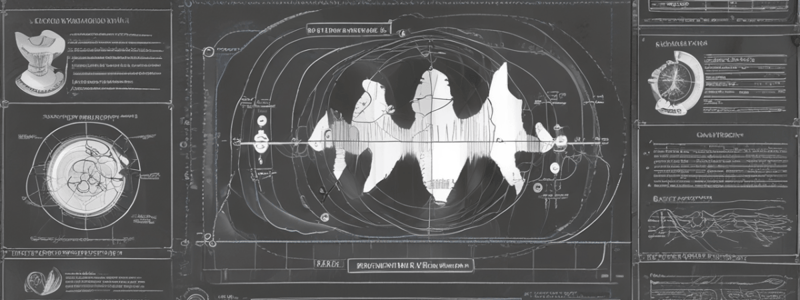Podcast
Questions and Answers
What is the primary purpose of conducting a scientific experiment?
What is the primary purpose of conducting a scientific experiment?
- To collect and evaluate data (correct)
- To prove a hypothesis
- To make observations
- To formulate a hypothesis
What is the term for the variable being manipulated in an experiment?
What is the term for the variable being manipulated in an experiment?
- Dependent variable
- Control variable
- Constant variable
- Independent variable (correct)
What is the next step after collecting data in a scientific experiment?
What is the next step after collecting data in a scientific experiment?
- Formulate a hypothesis
- Design an experiment
- Evaluate the data (correct)
- Make observations
What is the purpose of a graph in a scientific experiment?
What is the purpose of a graph in a scientific experiment?
What is the term for the variable being influenced by the independent variable in an experiment?
What is the term for the variable being influenced by the independent variable in an experiment?
What is the main purpose of a line graph in scientific experiments?
What is the main purpose of a line graph in scientific experiments?
What type of data is plotted on a line graph?
What type of data is plotted on a line graph?
What is the role of the x-axis in a line graph?
What is the role of the x-axis in a line graph?
What is the main difference between a line graph and a bar chart?
What is the main difference between a line graph and a bar chart?
What type of data can be represented on a bar chart?
What type of data can be represented on a bar chart?
What does the height of the bar in a basic bar graph represent?
What does the height of the bar in a basic bar graph represent?
What is the primary purpose of a pie chart?
What is the primary purpose of a pie chart?
What type of data is typically displayed in a flow chart?
What type of data is typically displayed in a flow chart?
What is the primary function of the hypothalamus in the ACTH negative feedback loop?
What is the primary function of the hypothalamus in the ACTH negative feedback loop?
What is the outcome when cortisol levels in the blood are high in the ACTH negative feedback loop?
What is the outcome when cortisol levels in the blood are high in the ACTH negative feedback loop?
Flashcards are hidden until you start studying
Study Notes
The Basics of Scientific Experiments
- A scientific experiment involves: making observations, formulating a hypothesis, designing and conducting an experiment, collecting and evaluating data, accepting or rejecting the hypothesis, and formulating a new hypothesis if necessary
Independent and Dependent Variables
- Independent variable (x): the cause, what is being manipulated to test a hypothesis
- Dependent variable (y): the effect, what is being influenced by the independent variable
- Example: researching how different genders respond to the sound of a crying baby, where gender is the independent variable and neural responses are the dependent variable
Types of Data
- Numerical data: data in the form of numbers
- Categorical data: non-numerical data, such as country names
- Data can be a combination of numerical and categorical data
Line Graphs and Tables
- Line graphs and tables are used to record independent and dependent variables
- Tables list x and y values next to each other separately
- Line graphs chart x and y values as data points (x, y) on a graph
- Line graphs compare numerical data and create a visual of trends
- A line graph has two axes: the x-axis (horizontal) for independent x values and the y-axis (vertical) for dependent y values
Interpreting Graphs and Charts
- Different types of data require different graphs and charts
- Line graphs are used for comparing strictly numerical data and are helpful when comparing small changes in a trend over time
- Bar charts are useful for comparing larger changes or differences in data among different groups and can be used with non-numerical data
- Pie charts are useful for comparing percentages
- Flow charts are helpful for comparing non-numerical concepts and showing cause and effect relationships
Line Graphs
- A line graph plots independent (x) and dependent (y) variables on a graph to create a visual trend
- The graph contains an x-axis and a y-axis
- Variables are represented as coordinate pairs, written as (x, y)
- Example: a student records the number of days with temperatures over 100°F each summer for five years and plots the data on a line graph to show the trend
Bar Charts
- A bar chart uses rectangular bars to represent different values
- The height of the bar is proportional to the value of the data represented
- Bar charts may plot data vertically or horizontally
- Example: a bar chart showing the average age of citizens in different American cities
Pie Charts
- A pie chart is used to compare percentages
- Each slice of the pie represents a percentage of a whole population or data set
- The size of the slice is the dependent variable (y)
- Example: a pie chart showing the US trade deficit by country
Flow Charts
- A flow chart is a diagram showing concepts or steps in a process in relation to one another
- Flow charts are helpful for simplifying complex relationships or procedures and showing cause and effect relationships
- Example: a flow chart showing the ACTH negative feedback loop
Studying That Suits You
Use AI to generate personalized quizzes and flashcards to suit your learning preferences.




